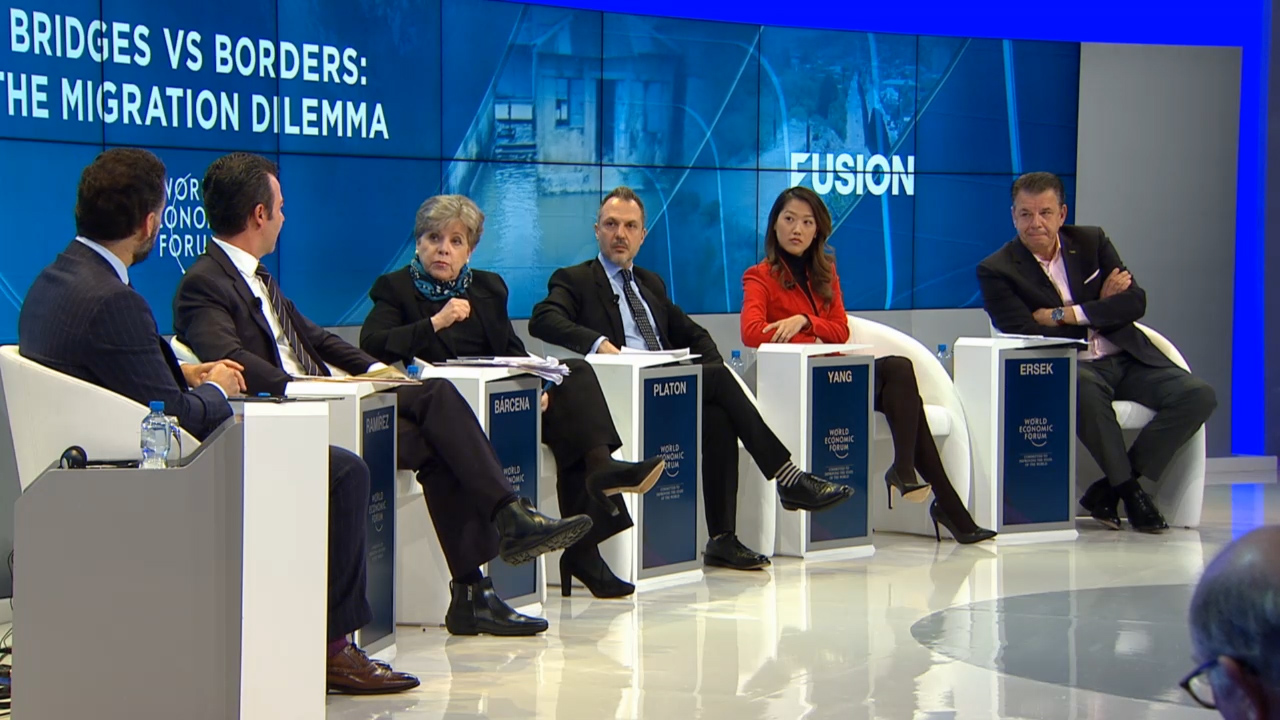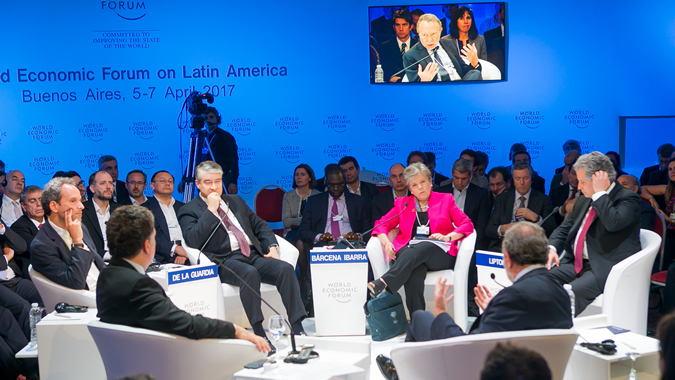ECLAC: Growth with Equality, Integration and Migration are Priority Issues for Latin America and the Caribbean
Alicia Bárcena, Executive Secretary of the United Nations regional organization, participated in diverse sessions of the annual meeting of the World Economic Forum held this week in Davos, Switzerland.

Growth with equality, integration within the region and with other regions of the world, as well as migration, are priority issues for Latin America and the Caribbean, a region that must put an end to the culture of privilege and advance toward economic, social and environmental equality to guarantee its inhabitants’ right to development, affirmed Alicia Bárcena, Executive Secretary of the Economic Commission for Latin America and the Caribbean (ECLAC), during the meeting of the World Economic Forum 2018, which came to a close today in Davos, Switzerland.
The United Nations high official participated in diverse sessions of the Forum this week, where she addressed recent trends and the determining factors behind the evolution of inequality at the global and regional levels; the challenges facing the Pacific Alliance and integration in Latin America and the Caribbean; the strengthening of institutional and regulatory architecture to advance toward gender equality, and the dilemma of migration in the region, among others.
“Latin America is characterized by high levels of inequality brought to bear not only in the income gap between rich and poor, but also in the gap in achievements and opportunities in jobs, education, health, and across various population groups,” said Bárcena during remarks she made on the panel The Big Picture on Inequality, along with David Autor, an economist at the Massachusetts Institute of Technology (MIT).
The regional organization’s senior representative asserted that in the last 15 years, Latin America has progressed in the reduction of inequality in income distribution; however, this trend has slowed significantly in recent years.
She pointed out that between 2002-2008, the simple average of Gini coefficients for the region fell by a rate of 1.5% per year; between 2008-2014, the reduction was 0.7% annually; while between 2014-2016, the inequality average was reduced by just 0.4% per year.
“Equality must be the engine of economic growth and sustainable development in the region,” underscored the ECLAC senior representative.
“Latin America and the Caribbean urgently require the dismantling of the culture of privilege that still prevails in the region and is manifested, for instance, in existing high levels of tax evasion and corruption,” she added.
In the framework of her participation in the Davos Forum, Alicia Bárcena moderated a panel on the challenges facing the Pacific Alliance and integration in Latin America and the Caribbean in the current global context.
In that context, she underlined that spaces must be sought to strengthen the convergence between the Alliance and the Southern Common Market (Mercosur), with the purpose of boosting and facilitating intra-regional trade.
“The Pacific Alliance is at this moment aiming to consolidate itself, expand and establish a more long-term strategic outlook,” asserted Bárcena, announcing that, on that path, ECLAC and the Inter-American Development Bank (IDB) will support the presidencies of Colombia and Mexico in the formulation of an ambitious vision of the future.
Also participating on the panel were Juan Manuel Santos, President of Colombia; Mercedes Aráoz, Prime Minister of Peru; Ildefonso Guajardo, Secretary of Economy of Mexico; Steven Ciobo, Australian Minister for Trade, Tourism and Investment; as well as Rebeca Grynspan, Ibero-American Secretary General and Ricardo Meléndez-Ortiz, Executive Director of the International Centre for Trade and Sustainable Development (ICTSD), among others.
During her presentation, Bárcena highlighted the opportunity opening up for the region as ties are strengthened between Latin America and the Caribbean and China, reaffirmed on Monday 22nd in Santiago, Chile at the Second Ministerial Meeting of the Forum of the Community of Latin American and Caribbean States (CELAC) and China.
She pointed out that, according to ECLAC’s estimates contained in the document Exploring new forms of cooperation between China and Latin America and the Caribbean, published in the framework of the China-CELAC Forum, bilateral trade multiplied 22 times between 2000 and 2013, and in 2017 reached USD 266 billion. “This means progress of 53% toward the goal with seven years to reach it,” emphasized Bárcena.
She highlighted the upcoming signing of the Trans-Pacific Economic Cooperation Agreement (TPP-11), which will take place in the Chilean capital in March, and also underlined that the next presidency of the Group of 20 (G20) will held by Argentina, opening a new opportunity for the region.
The United Nations high official also participated in the session entitled Bridges vs Borders: The Migration Dilemma.
Also participating on that panel, moderated by Enrique Acevedo of Univisión, were Kwiri Yang, Founder and Executive Director of LifeGyde; Hikmet Ersek, Executive Director of Western Union; Alejandro Ramírez, Director General of Cinépolis and Platon Antoniou, photographer and Founder of The People's Portfolio.
During her remarks, Alicia Bárcena urged countries to look at migration as a contribution to democracy, diversity and sustainable development.
She pointed out that there are currently 30 million natives of the region living outside their country of birth, amounting to 4% of the population.
On the other hand, the population born outside the region and currently residing in the countries of Latin America and the Caribbean is equivalent to a quarter of those who have emigrated and make up just 1.1% of the region’s total population. In contrast, immigrants from within the region of Latin America and the Caribbean represent 62.8% of total immigrants, a figure that continues to grow in relation to previous decades.
She underscored that the United Nations are pushing for a global Pact for safe, orderly and regular migration and called for an ambitious agreement focused on equality and rights. Likewise, she invited the private sector to contribute more broadly to the debate through innovative and sustainable solutions for the productive integration of migration.
In the context of her participation in the World Economic Forum 2018, Alicia Bárcena also attended a breakfast organized by the Women Political Leaders Global Forum, where she urged continued strengthening of the institutional and regulatory architecture to advance toward gender equality, autonomy and female leadership.
Furthermore, she held meetings with Jorge Faurie, Argentina’s Minister of Foreign Affairs and Worship; Winnie Byanyima, Executive Director of Oxfam International; Jean Todt, UN Secretary General’s Special Envoy for Road Safety, and representatives of multilateral organizations and the region’s business sector.
Related content

At World Economic Forum on Latin America Alicia Bárcena Called for Forging New Compacts in the Region to Resume Growth and Reduce Inequality
ECLAC’s Executive Secretary is participating in the annual gathering being held through Friday in Buenos Aires, Argentina.
Country(ies)
- Latin America and the Caribbean
Contact
Public Information Unit
- prensa@cepal.org
- (56 2) 2210 2040